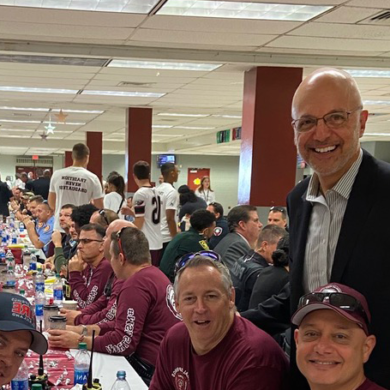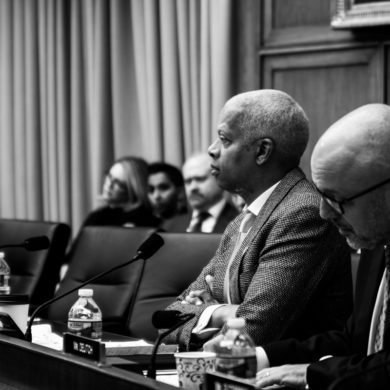By Ruth Vitale
RUTH VITALE: Representative Roby, thank you so much for agreeing to be interviewed. How did you come to be interested in intellectual property and copyright policy?
CONGRESSWOMAN MARTHA ROBY: I always wanted to work in the music industry. I was a music major in college, graduating with a Bachelor of Music degree, and I worked for music labels in New York City and Nashville. I have always been drawn to creators and have a deep appreciation for the work they produce in film, music, art, television, and many other methods. When I had the opportunity to become the Ranking Member on the House Judiciary Subcommittee on Courts, Intellectual Property, and the Internet, it seemed like a great way to get more involved in issues I already had an interest in.
RV: You represent the people of Alabama. As Ranking Member of the Subcommittee on Courts, Intellectual Property, and the Internet, how do you explain to Alabamians why copyright is important to America? How is copyright particularly important for your constituents?
MR: In my role as Ranking Member, I have strived to educate my constituents and people across the country on just how important copyright is to everyday Americans. Last year, I dedicated one of my Weekly Columns on this very topic of why copyright matters, especially to Alabama. In Alabama specifically, the music industry contributes $636.09 million to the GDP and supports more than 14,000 jobs. The motion picture and television industry are responsible for more than 10,200 jobs and $387 million total wages in our state. There are 958 music businesses in Alabama and nearly 720 motion picture and television businesses, including 381 production-related companies. Most people aren’t aware of the impact that these industries have, and I think it is vital that we get the message out on the importance of protecting copyright.
RV: Last year, you came to Los Angeles and visited various production stages around the city. What did you learn from that experience and how has it impacted your work on copyright and intellectual property since then?
MR: One of the most eye-opening experiences that I had was being able to experience the pirate living room demonstration. This was a demonstration where a device that looks like a normal cable box is plugged into a television that is connected into a wireless internet network. This device is essentially a streaming mechanism that has been pre-loaded with an app. This app facilitates the discovery of pirated materials on the internet, making it seamless and easy for an end user to access illegally pirated material available to stream online.
What many people don’t realize, outside from these devices accessing illegally pirated content, is that they are loaded with viruses and malware. In the demonstration that I saw, the device infiltrated the wireless network it was connected to and placed several malicious codes of software onto the computers. This malicious software can be used to extort money, infect other machines, and hack into sensitive information. This in turn helps to finance criminal organizations around the world who are largely behind the largescale pirating of content. It is important for American consumers to realize that using these fraudulent devices is not a victimless crime and has widespread negative impacts.
RV: In December of last year, you signed a letter with your colleagues to The American Law Institute (ALI) expressing concerns over its attempt to develop a Restatement of Copyright. How would you explain the importance of pushing back against this effort to a copyright layperson? (Which, let’s be honest, is most of us!)
MR: The American justice system is based on common law which is derived from customs and prior judicial decisions as opposed to statutory law which is written into law. In order to assist judges in understanding common law, the American Law Institute creates restatements that summarize judicial rulings and interpretations across various jurisdictions. These restatements are often cited and are considered persuasive authorities from a respected organization.
The concern with developing a Restatement of Copyright is that Copyright Law is federal statutory law, not common law. Statutes do not need to be summarized or restated because the law has been clearly articulated by Congress in the statute and through legislative history. Essentially, federal statutes do not need a Restatement and efforts to do so may undermine Congressional intent.
RV: Do you think large internet platforms like YouTube are being cooperative in trying to help creative people police infringement online or would you like to see more cooperation?
MR: I think it is vitally important that the creative community have access to content protection tools so that they are enabled to make sure only legally authorized content is on these platforms. These platforms have developed very powerful tools that are useful to creators, but sometimes only the larger creators are able to gain access to these tools. I will continue to work with platforms and advocate that these tools are available to all creators no matter their size.
RV: What are your favorite movies and television shows you’ve watched since the onset of the pandemic?
MR: There are too many great shows out there right now to pick just one.
RV: And, have you read any good books recently?
MR: I am a very avid reader and always have a stack of books lined up. I really enjoy historically accurate fiction.
RV: Finally, we were so sad when you announced that you would not be seeking another term. You have been such a tireless advocate for creativity. Can you tell us what your next chapter is going to be?
MR: I am so thankful to the people of Alabama’s Second Congressional District for placing their confidence in me since January of 2011 to be their representative in Congress. After a lot of prayer and consideration, my husband and I have made the decision that we’re going to close this wonderful chapter in our lives. I have no concrete plans at this time, but I look forward to what might be next.



